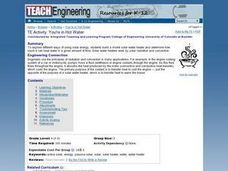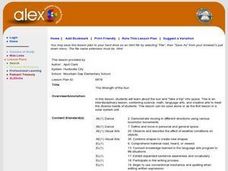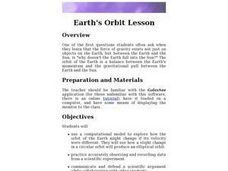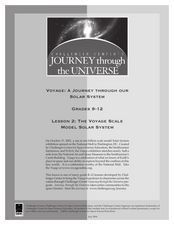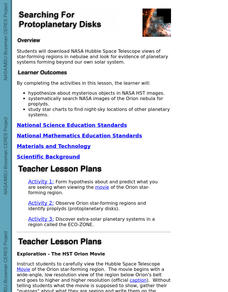Curated OER
TE Activity: You're in Hot Water
Young scholars study different ways of using solar energy. They design a solar water heater and determine how much water it can heat in a set amount of time. They examine how the heaters work by solar radiation and convection.
Curated OER
Exploring the Interstellar Medium
Students investigate the Interstellar Medium and the Local Bubble that the Sun is inside. They read and discuss a handout, answer discussion questions, observe a demonstration of light scattering, and conduct an experiment on the...
Alabama Learning Exchange
The Strength of the Sun
Students explore the sun and take a "trip" to outer space.
Teach Engineering
Maximum Power Point
Investigate the maximum power output of a photovoltaic panel with a lesson that introduces the class to the maximum power point. Individuals learn how to determine the maximum power point of a solar panel by using Ohm's law and the power...
Teach Engineering
Photosynthesis—Life's Primary Energy Source
Wouldn't it be great if you could produce your own food? Scholars learn about the processes of photosynthesis and cellular respiration in plants. They consider how to use photosynthesis as a model of an efficient system and how to apply...
Curated OER
Ellipses and Kepler's First Law
The class examines graphs in the form r = F(¿¿) in polar coordinates (r, ¿¿), in particular with the circle, ellipse and other conic sections. They determine the nature of an ellipse by studying the role of the semimajor axis and...
Curated OER
Make a Sundial
Young scholars explore space science by conducting a sun experiment in class. In this time telling lesson, students discuss how the sun sits in our sky at exact times each day and how astronomy is based on our perspective of the solar...
Curated OER
Working With Scientific Notation
In this scientific notation worksheet, students read about the discovery of new planets. They use scientific notation to identify the number of miles from one planet to the next. Students determine how long it would take to travel, when...
Curated OER
Earth's Orbit Lesson
Tenth graders devise a computational model to explore how the orbit of the Earth might change if its velocity were different. Using accurately recorded data, 10th graders defend a scientific argument.
Curated OER
Out of This World and Into Our Classroom
Young scholars complete a background survey on technology to determine where they need to focus on to complete this project. Using the Internet, they research a topic in Astronomy they are interested in and determine what math concepts...
Curated OER
Walk a Mile in your Orbit
Middle schoolers create an awareness of the distance between the planets and the complexity of the solar system through a model of an active solar system. they incorporate physical education and math with the ability to convert distances...
Curated OER
The Voyage Scale
Young scholars identify how models are powerful tools of exploration and that the sizes of the planets and distances between the planets in the Solar System span a large range. They make a sign for each planet they have created in the...
Curated OER
Scientific Notation
Students explore the concept of expressing numbers in scientific notation. In this scientific notation lesson, students understand the importance of using scientific notation by finding real world examples where scientific notation is...
Curated OER
99.86% - Measuring Our Sun's Mass
Students determine just how large the sun is. In this solar system lesson, students follow the prescribed steps to draw a box that represents the size of the sun and its mass compared to the entire solar system.
Curated OER
Searching For Protoplanetary Disks
Students download NASA Hubble Space Telescope views of star-forming regions in nebulae and look for evidence of planetary systems forming beyond our own solar system. They hypothesize about mysterious objects in NASA HST images.
Curated OER
Distance in Space
Sixth graders explore space science by measuring distances between planets. In this solar system lesson, 6th graders view a Bill Nye video and discover the conversion between the metric system and imperial measuring systems. Students...
Curated OER
In a Galaxy Far, Far, Far Away
Sixth graders compare distances between objects in the solar system. They investigate how light years are measured and when using them to measure how distances compare with one another. They write an essay exploring the possibility of...
Curated OER
Unit 2 Sun & Stars
Students describe stellar objects using terms such as stars, planets, satellites, orbits and light. In this sun and stars unit, students research stellar objects through seven individual lessons discovering star characteristics, how...
Curated OER
Spaced Out
Students explore the transit of Venus and the information that this minieclipse provides about the distance between the Earth and the sun. They create their own astronomical units.
Curated OER
How Big Are Earth, Sun, and Moon?
Third graders draw what they believe is in space on a dry erase board. In groups, they are given a beaker half filled with water and they add a teaspoon of oil, observing the different layers that form. To end the lesson, they identify...
Curated OER
Science Trail
Students explore the solar system by conducting Earth science experiments. In this Sun lesson plan, students identify the different seasons on Earth and discuss their purpose and cause. Students create a sundial and observe the changes...
Mascil Project
Closed Greenhouses
Controlling the efficiency of a greenhouse is a mathematical task. A collaborative project challenges learners to create an efficiency plan for a closed greenhouse. Using algebraic equations, they consider a set of constraints, design...
Curated OER
Scale Basketball
Students understand that a spreadsheet can be used to find the best scale to use in a model. They place the distances of the planets of the solar system to the Sun in one column of the spreadsheet. Students try different scales so that...
Curated OER
Scale Models to Planet Size
Students consider the comparative sizes of the planets in the solar system. In this scale lesson, students select balls of different sizes to represent the planets in the solar system.
Other popular searches
- Solar System Math
- Solar System Math Lessons
- Solar System Math Graph
- Solar System Math Age
- Solar System Math Ration
- Solar System Math Lessons'
- Solar System and Math
- Solar System Math Worksheets
- Solar System & Math
- Solar Systems Math Math
- Solar System Math Lesson Plans


